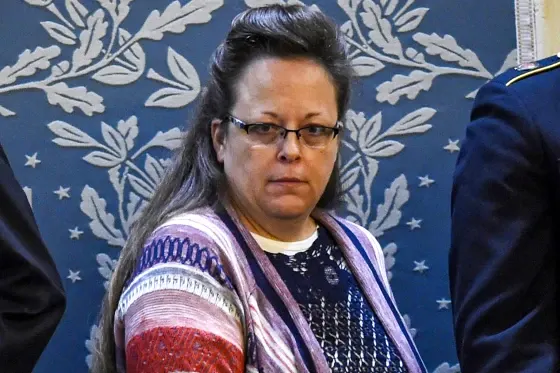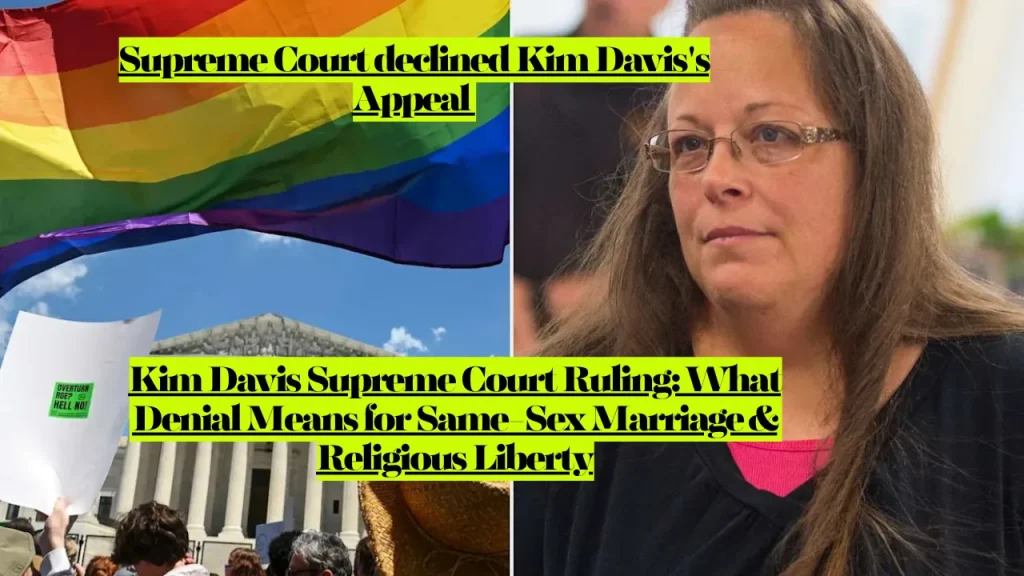Kim Davis Supreme Court Ruling, What Denial Means for Same-Sex Marriage & Religious Liberty
The Supreme Court declined Kim Davis’s appeal on November 10, 2025, without explanation, upholding her $360,000 damages award to a same-sex couple she denied a marriage license. Davis must pay $100,000 in damages plus $260,000 in attorney’s fees to David Moore and David Ermold, whose marriage license she refused in 2015. The Court’s refusal to revisit Obergefell v. Hodges ends Davis’s decade-long effort to challenge same-sex marriage rights through religious freedom arguments.
No justices noted dissents from the denial, signaling limited appetite to overturn marriage equality despite the Court’s conservative majority.
What Was The Kim Davis Case About?
Davis, Rowan County clerk in Kentucky, refused to issue marriage licenses to same-sex couples following the Supreme Court’s 2015 Obergefell ruling legalizing same-sex marriage nationwide. She cited religious objections to same-sex marriage, withholding licenses to all couples rather than comply with the landmark decision.
Davis told Moore and Ermold she was acting “under God’s authority” and directed them to obtain a license in a different county. A federal court found she violated a court order to issue licenses and jailed her for six days. While incarcerated, Moore and Ermold obtained their license from another clerk in her office.
Kentucky later changed the law, removing clerk names from marriage licenses to address the controversy. Davis lost her 2018 reelection bid.
What Did The Supreme Court Decide?
The Supreme Court denied Davis’s appeal on Monday, November 10, 2025, via routine order list without comment. It would have taken four justices to grant review, but no justices noted dissents.
The decision leaves intact the Sixth Circuit Court of Appeals ruling that rejected Davis’s arguments. The appeals court concluded Davis “cannot raise the First Amendment as a defense because she is being held liable for” acting on behalf of the government when denying the license.
The court stated “The Bill of Rights would serve little purpose if it could be freely ignored whenever an official’s conscience so dictates”.
Related Lawsuit: Brenay and Akira Lawsuit, TikTok influencer Brenay Kennard ordered to pay $1.75M in Akira Montague lawsuit for alienation of affection

Why Did The Court Refuse To Hear The Case?
The Supreme Court receives 7,000-8,000 petitions annually and agrees to hear only about 1%—roughly 80 cases per year. Legal experts considered Davis’s bid a long shot, noting her case was “extremely narrow” and her arguments had already been rejected by the Sixth Circuit more than once.
The original jury of nine women agreed the couple deserved compensation regardless of Davis’s religious belief. Every court that examined her religious freedom defense rejected it at trial, appellate, and Supreme Court levels.
Conservative Justice Amy Coney Barrett told the New York Times in October 2025 there are “very concrete reliance interests” at stake with same-sex marriage. Justice Samuel Alito, while criticizing Obergefell broadly during a fall address, stressed it was “a precedent of the court that is entitled to the respect afforded by the doctrine of stare decisis”.
What Legal Claims Did Kim Davis Make?
Davis raised two primary arguments in her Supreme Court petition:
First Amendment Religious Defense: Davis argued First Amendment protection for free exercise of religion immunized her from personal liability for denying marriage licenses. She claimed religious protections should shield her from damages even though she acted as a government official.
Overturn Obergefell: Davis called Obergefell “egregiously wrong” and argued it was time “for a course correction” on same-sex marriage. She cited Justice Clarence Thomas’s opinion that the Court should reconsider Obergefell and quoted Justice Barrett’s book stating “stare decisis is only a presumption; the Court can and does fix mistakes”.
Davis’s attorneys argued “The Court can and should fix this mistake” regarding Obergefell.
What Are The Legal Implications For Religious Liberty?
The denial clarifies that government officials cannot invoke religious freedom to deny constitutional rights to citizens. The appeals court ruled Davis was “acting on behalf of the government” when she denied licenses, conduct not protected by the First Amendment.
While the Supreme Court in Obergefell acknowledged “many people ‘deem same-sex marriage to be wrong’ based on ‘religious or philosophical premises,'” courts concluded “those opposed to same-sex marriage do not have a right to transform their ‘personal opposition’ into ‘enacted law and public policy'”.
The ruling reinforces that public officials must comply with the law regardless of personal beliefs. Attorney Michael Gartland stated once Obergefell was decided, “Davis had no right to institute her own policy for issuing marriage licenses”.
For similar cases involving questions to ask a custody lawyer during consultation, understanding how courts balance religious beliefs with legal obligations remains crucial.
How Does This Affect Government Employee Rights?
The Davis case establishes clear boundaries between personal religious beliefs and official duties. Government employees retain First Amendment protections as private citizens but cannot refuse to perform job duties that conflict with personal beliefs.
The appeals court emphasized Davis is “protected by the First Amendment when she is a private citizen, but she was acting on behalf of the government” when denying licenses.
This principle extends beyond marriage licenses to any government service. Public officials who cannot fulfill job requirements due to religious objections must seek accommodations, resign, or face liability for violating citizens’ constitutional rights.
Those facing employment discrimination based on religious beliefs should understand the distinction between private belief and public duty.
What Precedent Does This Case Set?
The denial affirms Obergefell v. Hodges remains binding precedent. Nearly 600,000 same-sex couples have married since the 2015 decision, according to the Williams Institute at UCLA School of Law.
The Respect for Marriage Act, signed by President Biden in 2022, repeals the Defense of Marriage Act and recognizes the legitimacy of same-sex and interracial marriages. Even if Obergefell were overturned, federal protection would remain, though individual states could refuse recognition.
The case also reinforces qualified immunity limitations. Government officials cannot claim religious defenses against civil rights violations when acting in official capacities.
What Are The Implications For Similar Cases?
Mat Staver, founder of Liberty Counsel representing Davis, vowed to “continue to work to overturn Obergefell” and bring another case to the Supreme Court. According to Lambda Legal, nine states in 2025 have entertained bills or resolutions criticizing Obergefell or sought to limit marriage to heterosexual couples.
On October 24, 2025, the Supreme Court of Texas adopted language allowing judges to refuse performing same-sex wedding ceremonies due to religious beliefs. However, this applies only to judges performing ceremonies, not government clerks issuing licenses.
Understanding family law attorney roles in marriage equality cases remains important as legal challenges continue.

What Are Common Misconceptions About The Kim Davis Case?
Misconception #1: The case challenged same-sex marriage directly
Davis’s case primarily concerned whether government officials have religious defenses against civil rights liability. The couple argued Davis had “waived the argument” about overturning Obergefell earlier in litigation, making it improperly presented.
Misconception #2: Davis faced criminal charges
Davis faced civil liability for damages, not criminal prosecution. Her six-day jail term resulted from contempt of court for violating a judge’s order, not criminal charges.
Misconception #3: The ruling criminalizes religious belief
The decision addresses official conduct, not private belief. Critics claimed Davis would face “crippling monetary damages based on nothing more than purported hurt feelings,” but courts found constitutional rights violations justified compensation.
Misconception #4: Accommodation was impossible
Kentucky later enacted a law removing clerk names from marriage licenses, providing the accommodation Davis initially sought. The issue centered on her refusal to issue any licenses during the controversy period.
How Do Courts Apply This Ruling?
Lower courts now have clear guidance that government officials acting in official capacities cannot invoke religious freedom to deny services. The three-level rejection—trial court, appeals court, and Supreme Court denial—creates strong precedent.
The ruling “has been rejected at the trial court level, at the 6th Circuit Court of Appeals, and it’s not going to get reviewed at the Supreme Court, so those arguments have all been rejected by every court that’s ever heard them”.
Future cases involving government officials refusing services based on religious objections will likely follow this framework: religious protections apply to private citizens, but government representatives must fulfill official duties regardless of personal beliefs.
Frequently Asked Questions
What is the Kim Davis lawsuit about?
Kim Davis, former Rowan County Kentucky clerk, refused to issue marriage licenses to same-sex couples after the 2015 Obergefell ruling legalizing same-sex marriage. She cited religious objections and withheld licenses from all couples. Moore and Ermold sued for violating their constitutional right to marry, winning $100,000 in damages plus $260,000 in legal fees.
What did the Supreme Court decide in the Kim Davis case?
The Supreme Court declined Davis’s appeal on November 10, 2025, without explanation, leaving intact the $360,000 damages award. No justices noted dissents from the denial. The Court refused to revisit Obergefell v. Hodges or grant Davis a religious freedom defense against liability.
What are the legal implications of the Kim Davis ruling?
The denial establishes government officials cannot invoke religious freedom to deny constitutional rights. Courts held Davis was “acting on behalf of the government” when denying licenses, conduct not protected by the First Amendment. Public employees must fulfill job duties regardless of personal beliefs or face civil liability.
How does the Kim Davis case affect religious liberty?
While the Court acknowledged in Obergefell that many people oppose same-sex marriage based on religious premises, “those opposed to same-sex marriage do not have a right to transform their ‘personal opposition’ into ‘enacted law and public policy'”. Religious protections remain for private citizens but not government officials performing public duties.
Can government employees refuse services based on religious beliefs?
Government employees are “protected by the First Amendment when they are private citizens, but they act on behalf of the government” in official capacities. Officials who cannot fulfill job requirements due to religious objections must seek accommodations or resign rather than deny services.
Will Obergefell v. Hodges be overturned?
Legal experts believe it’s “extremely unlikely” Obergefell will be overturned, calling it “well-grounded in the equal protection clause”. The Respect for Marriage Act provides federal protection even if Obergefell were reversed, though states could refuse to recognize marriages.
What happened to Kim Davis after the case?
Davis lost her 2018 reelection bid. She must pay $360,000 to Moore and Ermold to compensate for denied services, emotional distress, and legal fees. Her attorney vowed to continue efforts to overturn Obergefell through future cases.
Disclaimer: This information is for educational purposes only and does not constitute legal advice. Case details, legal implications, and applications vary by individual circumstances and applicable law. Consult official court resources or a qualified attorney for specific guidance regarding the Kim Davis case or similar religious liberty matters.
About the Author

Sarah Klein, JD, is a licensed attorney and legal content strategist with over 12 years of experience across civil, criminal, family, and regulatory law. At All About Lawyer, she covers a wide range of legal topics — from high-profile lawsuits and courtroom stories to state traffic laws and everyday legal questions — all with a focus on accuracy, clarity, and public understanding.
Her writing blends real legal insight with plain-English explanations, helping readers stay informed and legally aware.
Read more about Sarah
